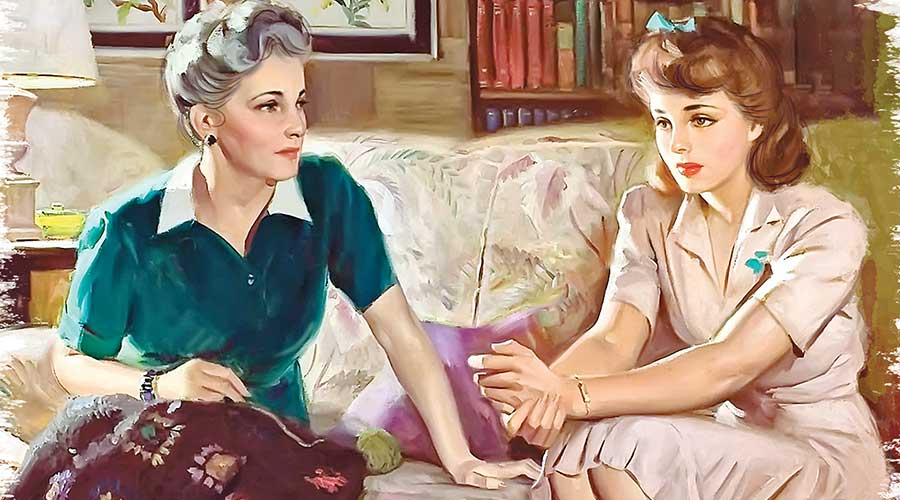An Epidemic
- 13 Apr - 19 Apr, 2024

Miss Dorcas True stood in her square front entry, saying good-by to Phoebe Marsh. The entry would have been quite dark from its time stained woodwork and green paper, except for the twilight glimmer swaying and creeping through the door leading into the garden. Out there were the yellow of coreopsis, and the blue of larkspur, melted into a dim magnificence of colour, suffusing all the air; to one who knew what common glory was a-blowing and a-growing there without, the bare seclusion of the house might well seem invaded by it, like a heavenly flood. Phoebe, too, in her pink calico, appeared to spread abroad the richness of her youth and bloom, and radiate a certain light about her where she stood. She was tall, and her proportions were ample. She had the shoulders and arms of the women of an elder time, whom we classify vaguely now as goddesses.
The Tiverton voices argued that she would have been "real handsome if she'd had any sense about doing' her hair;" which was brought down loosely over her ears, in the fashion of her Aunt Phoebe's miniature. Miss Dorcas beside her looked like one of autumn's brown, quiescent stems left standing by the way. She was firmly built, yet all her lines subdued themselves to that meagerness which ever dwells afar from beauty.
The deep marks of hard experience had been graven on her forehead, and her dark eyes burned inwardly; the tense, concentrated spark of pain and the glowing of happy fervor seemed as foreign to them as she herself to all the lighter joys and hopes. Her only possibility of beauty lay in an abundance of soft dark hair; but even that had been restricted and coiled into a compact, utilitarian compass. She had laid one nervous hand on Phoebe's arm, and she grasped the arm absently, from time to time, in talking, with unconscious joy in its rounded warmth.
She spoke cautiously, so that her voice might not be heard within. "Then you come over to-morrow, after the close of service, if it's convenient. You can slip right into the kitchen, just as usual. Any news?" Phoebe, too, lowered her voice, but the full sweetness of its quality thrilled out. "Mary Frances Giles is going to be married next week. I've been down to see her things. She's real pleased." "You don't suppose they'll ask father to marry them?" Miss Dorcas spoke quite eagerly. "Oh, no, they can't! It's a real wedding, you know. It's got to be at the house." "Yes, of course it's got to! I knew that myself, but I couldn't help hoping. Well, goodnight. You come Sunday." Phoebe lifted her pink skirts about her, and stepped, rustling and stately, down the garden walk. Miss Dorcas drew one deep breath of the outer fragrance, and turned back into the house.
A thin voice, enfeebled and husky from old age, rose in the front room, as she entered: "Dorcas! Dorcas! You had a caller?" Her father, old Parson True, lay in the great bed opposite the window. A thin little twig of a man, he was still animated, at times, by the power of a strenuous and dauntless spirit. His hair, brushed straight back from the overtopping forehead, had grown snowy white, and the eager, delicate face beneath wore a strange pathos from the very fineness of its nervously netted lines. Not many years after his wife's death, the parson had shown some wandering of the wits; yet his disability, like his loss, had been mercifully veiled from him. He took calmly to his bed, perhaps through sheer lack of interest in life, and it became his happy invention that he was "not feeling well," from one day to another, but that, on the next Sunday, he should rise and preach. He seemed like an unfortunate and uncomplaining child, and the village folk took pride in him as something all their own; a pride enhanced by his habit, in this weak estate, of falling back into the homely ways of speech he had used long ago when he was a boy "on the farm."
In his wife's day, he had stood in the pulpit above them, and expounded scriptural lore in academic English; now he lapsed into their own rude phrasing, and seemed to rest content in a tranquil certainty that nothing could be better than Tiverton ways and Tiverton's homely speech. "Dorcas," he repeated, with all a child's delight in his own cleverness, "you've had somebody here. I heard you!" Dorcas folded the sheet back over the quilt, and laid her hand on his hair, with all the tenderness of the strong when they let themselves brood over the weak. "Only Phoebe, on her way home," she answered, gently. "The doctor visited her school to-day.
She thinks he may drop in to see you to-night. I guess he give her to understand so." The minister chuckled. "Isn’t he a smart one?" he rejoined. "Smart as a trap! Dorcas, I 'am not finished my sermon. I guess I shall have to preach an old one. You lay me out the one on the salt losing' its savour, an' I'll look it over." "Yes, father." The same demand and the same answer varied but slightly, had been exchanged between them every Saturday night for years. Dorcas replied now without thinking. Her mind had spread its wings and flown out into the sweet stillness of the garden and the world beyond; it even hastened on into the unknown ways of guesswork, seeking for one who should be coming. She strained her ears to hear the beating of hoofs and the rattle of wheels across the little, bridge.

The dusk sifted in about the house, faster and faster; a whippoorwill cried from the woods. So she sat until the twilight had vanished, and another of the invisible genii was at hand, saying, "I am Night." "Dorcas!" called the parson again. He had been asleep, and seemed now to be holding himself back from a broken dream. "Dorcas, has your mother come in yet?" "No, father." "Well, you wake me up when you see her down the road; and then you go an' carry her a shawl. I dunno what to make o' that cough!" His voice trailed sleepily off, and Dorcas rose and tiptoed out of the room. She felt the blood in her face; her ears thrilled noisily.
The doctor's, wagon, and had crossed the bridge; now it was whirling swiftly up the road. She stationed herself in the entry, to lose no step in his familiar progress. The horse came lightly along, beating out a pleasant tune of easy haste. He was drawn up at the gate, and the doctor threw out his weight, and jumped buoyantly to the ground. There was the brief pause of reaching for his medicine-case, and then, with that firm step whose rhythm she knew so well, he was walking up the path. Involuntarily, as Dorcas awaited him, she put her hand to her heart with one of those gestures that seem so melodramatic and are so real; she owned to herself, with a throb of appreciative delight.
This new doctor of Tiverton was no younger than Dorcas herself, yet with his erect carriage and merry blue eye she seemed to be not only of another temperament, but another time. It had never struck him that they were contemporaries. Once he had told Phoebe, in a burst of affection and pitying praise, that he should have liked Miss Dorcas for a maiden aunt. "Good evening," he said, heartily, one foot on the sill. "How's the patient?" At actual sight of him, her tremor vanished, and she answered very quietly,-- "Father's asleep. I thought you wouldn't want he should be disturbed; so I came out."
The doctor took off his hat, and pushed back his thick, unruly hair. "Yes, that was right," he said absently, and pinched a spray of southernwood that grew beside the door. "How has he seemed?" "About as usual." "You've kept on with the tonic?" "Yes." "That's good! Miss Dorcas, look up there. See that moon! See that wisp of an old blanket dragging over her face! Do you mind coming out and walking up and down the road while we talk? I may think of one or two directions to give about your father." Dorcas stepped forward with the light obedience given to happy tasking. She paused as! quickly. "Oh!" she exclaimed. "I can't. Father might wake up. I never leave him alone." "Never mind, then! let's sit right down here on the steps.
After all, perhaps it's pleasanter. What a garden! It's like my mother's. I could pick out every leaf in the dark, by the smell. But you're alone, aren't you? I'm not keeping you from any one?" "Oh, no! I'm all alone, except father." "Yes. The fact is, I went into your school to-day, and the teacher said she was coming here to-night. She offered to bring you a message, but I said I should come myself. I'm abominably late. I couldn't get here any earlier." "Oh, yes! Phoebe! She was here over an hour ago. Phoebe's a real comfort to me." She was seated on the step above him, and it seemed very pleasant to her to hear his voice, without encountering also the challenge of his eyes. "No, is she though?" The doctor suddenly faced round upon her. "Tell me about it!" Then, quite to her surprise, Dorcas found herself talking under the spell of an interest so eager that it bore her on, entirely without her own guidance. "Well, you see there's a good many things I keep from father. He never's been himself since mother died. She was the mainstay here. But he thinks the church prospers just the same, and I never've told him the attendance dropped off when they put up that 'Piscopal building over to Sudleigh. You 'ain't lived here long enough to hear much about that, but it's been a real trial to him. The summer boarders built it, and some rich body keeps it up; and our folks think it's complete to go over there and worship, and get up and down, and say their prayers out loud." The doctor laughed out. "I've heard about it," said he. "You know what Brad Freeman told Uncle Eli Pike, when they went in to see how the service was managed?
Somebody found the places in the prayer-book for them, and Brad was quick-witted, and got on very well; but Eli kept dropping behind. Brad nudged him. 'Read!' he said out loud. 'Read like the devil!' I've heard that story on an average of twice a day since I came to Tiverton. I'm not tired of it yet!" Miss Dorcas, too, had heard it, and shrunk from its undisguised profanity. Now she laughed responsively. "I guess they do have queer ways," she owned. "Well, I never let father know any of our folks go over there. He'd be terrible tried. And I've made it my part in our meeting to keep up the young folks' interest as much as I can. I've been careful never to miss my Sunday-school class. They're all girls, nice as new pins, every one of them! Phoebe was in it till a little while ago, but now she comes here and sits in the kitchen while I'm gone.
to be continued...
COMMENTS